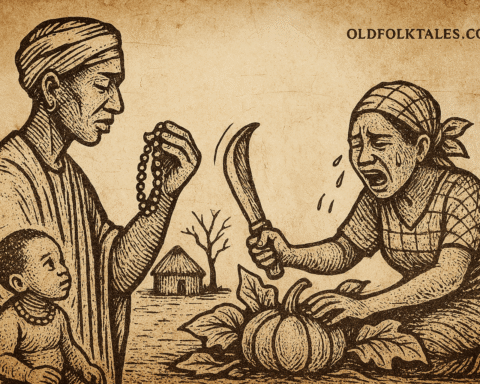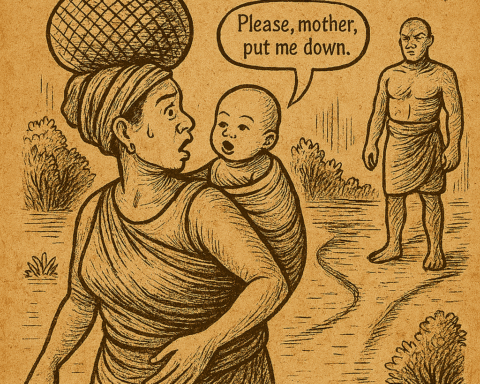In the rolling hills of a distant Guinea-Bissau village, where mango trees cast long shadows over dusty paths and the air hummed with the songs of evening birds, there lived a young man whose name was spoken with reverence throughout the land. Tedungal Djamanu was not wealthy, nor was he born of noble blood, but he possessed something far rarer than gold or titles an unwavering commitment to honesty that burned in his heart like an eternal flame.
While his neighbors might bend the truth when it suited them, or make promises they had no intention of keeping, Tedungal’s word was as solid as the ancient stones that marked the village boundaries. His honesty was not the easy kind that costs nothing, but the difficult sort that sometimes demanded great sacrifice. When he spoke, people listened, for they knew that every word carried the weight of absolute truth.
As the seasons turned and Tedungal reached the age when young men begin to think of marriage, he felt a stirring in his heart a longing for a companion who would share his life’s journey. The village girls were kind enough, but none seemed to understand the depth of his character, the seriousness with which he approached every aspect of life. And so, with his parents’ blessing and a simple bundle of provisions, he set out on the winding roads that connected village to village, seeking the woman who would become his wife.
Also read: The Curious Bird and Owl’s Secret
The journey proved more challenging than he had anticipated. The sun blazed mercilessly during the day, and the nights brought a chill that seeped into his bones. His provisions dwindled quickly, shared generously with fellow travelers and given to beggars along the way. By the third day, his stomach had begun to gnaw at itself with hunger, and his steps grew increasingly unsteady.
On the fourth day, as the afternoon sun cast dappled shadows through the leaves, Tedungal stumbled along a particularly lonely stretch of road. His vision blurred with exhaustion, and his parched lips cracked as he tried to swallow. It was then that he noticed it, a magnificent mango tree standing like a sentinel beside the path, its branches heavy with fruit so ripe and golden that they seemed to glow in the filtered sunlight.
The sweet fragrance of the mangoes filled his nostrils, making his empty stomach clench with desperate need. For a long moment, he stood beneath the tree, swaying slightly, his eyes fixed on the abundance above him. “Just one,” he whispered to himself, his voice barely audible. “Just one small mango, or I fear I may collapse here on this lonely road.”
He looked around carefully, scanning the empty landscape. No houses were visible, no people stirred in the distance. The road stretched away in both directions, empty and silent except for the gentle rustle of leaves in the breeze. Surely, he reasoned with himself, taking just one fruit to save his life could not be such a terrible sin.
With trembling hands, he reached up and plucked the ripest mango he could find. The fruit was perfect soft but not overripe, its skin giving way easily under his desperate fingers. He ate it quickly, almost frantically, the sweet juice running down his chin and bringing immediate relief to his aching body. The nourishment spread through him like warm honey, restoring strength to his limbs and clarity to his thoughts.
But as his physical hunger subsided, a different kind of pain began to gnaw at him. With each step he took away from that tree, the weight of his action pressed more heavily upon his conscience. The mango had saved his life, yes, but it had also stolen something precious from him his perfect record of honesty, his ability to look at himself in any mirror and see a man without fault.
“I am a thief,” he said aloud to the empty road, his voice heavy with shame. “Hunger may explain my action, but it does not excuse it. I have taken what was not mine, and no amount of justification can change that truth.”
The struggle within his heart was fierce. Part of him whispered that he should continue on his journey, that no one would ever know, that such a small transgression hardly mattered. But the deeper voice of his character the voice that had guided him since childhood would not be silenced. With a heavy sigh, he turned around and began retracing his steps, determined to find the owner of that mango tree and make amends for his theft.
The search took him most of the remaining daylight. He asked everyone he met about the tree, describing its location and the path he had traveled. Finally, as the sun was beginning to set, painting the sky in shades of orange and gold, he found what he was looking for a modest compound set back from the road, with the familiar mango tree visible in the yard.
An elderly man sat on a woven mat before his house, his weathered hands working slowly at some small task. His hair was white as cotton, and his face bore the deep lines of many years, but his eyes were sharp and alert as they studied the approaching stranger.
Tedungal approached with his head bowed in shame. When he reached the old man, he dropped to his knees and pressed his forehead to the ground in the traditional gesture of deep respect and supplication.
“Honored elder,” Tedungal said, his voice thick with emotion, “I come before you as a confessed thief. Today, as I passed beneath your mango tree, I was weak with hunger and near to fainting. I took one of your mangoes without permission. I have nothing of value to offer you now, but I swear by all that is sacred that I will work to repay this debt, however long it may take.”
The old man’s eyes narrowed as he studied the young man before him. He had lived many years and seen many people, and he had learned to read character in the set of shoulders, the tone of voice, the willingness to meet another’s gaze. What he saw in Tedungal intrigued him.
“So,” the old man said slowly, his voice carrying the weight of authority, “you confess freely to a theft that no one witnessed, and you offer compensation for a debt no one could have proven. This is… unusual.” He paused, seeming to consider something important. “Tell me, young man are you prepared to keep any promise you make to me, no matter how difficult?”
Without hesitation, Tedungal lifted his head and met the old man’s gaze directly. “I am known throughout my village as one whose word is his bond. Whatever promise I make to you, I will keep, even if it costs me everything.”
A strange smile played at the corners of the old man’s mouth. “Very well then. Since you have proven yourself willing to honor your obligations, you must accept this one: You will marry my daughter. But I must warn you—she is deaf and cannot hear your voice. She is mute and cannot speak sweet words to you. She is blind and cannot see your face. And she suffers from leprosy, so her skin is marked with disease. If you are truly the honest man you claim to be, you will take her as your wife.”
The words hit Tedungal like a physical blow. His dreams of finding a beautiful, healthy bride seemed to crumble around him like dried leaves. But even as his heart sank with disappointment, his sense of honor remained unshaken. He had given his word, made a sacred promise, and no personal cost could justify breaking it.
“So be it,” he said quietly, his voice steady despite the turmoil in his heart. “I will marry your daughter.”
The moment those words left his lips, the old man’s entire demeanor changed. The stern expression melted away, replaced by a smile of pure joy and approval. He clapped his hands together twice, and at the sound, the door of the house opened.
From within stepped a young woman so beautiful that Tedungal’s breath caught in his throat. Her skin was smooth and radiant, her eyes bright with intelligence and warmth, and when she smiled, it was like the sun breaking through storm clouds. She moved with grace and dignity, every step revealing perfect health and vitality.
“This,” said the old man, his voice now warm with affection, “is my daughter. I told you she was deaf, mute, blind, and leprous—but that was a test of your character, not a description of her condition.”
Tedungal stared in amazement as the old man continued, “Many young men pass by my tree each season. They steal my fruit and continue on their way without a second thought. Some I have caught in the act, others I have confronted later, but you are the first the very first who came back of his own accord to confess and make amends. Such honesty is rarer than precious gems, more valuable than all the gold in the kingdom.”
The wedding that followed was celebrated throughout the region. People came from distant villages to witness the marriage of Tedungal Djamanu, whose honesty had won him not just a bride, but a bride whose beauty was matched only by her virtue. The old man, it turned out, was a wealthy merchant who had long searched for a son-in-law worthy of his beloved daughter.
And so Tedungal’s journey to find a wife ended not with the lengthy search he had planned, but with a single mango and a choice between easy dishonesty and difficult truth. His story became legend, passed down through generations as a reminder that integrity is its own reward.
Moral Lesson
The tale of Tedungal Djamanu teaches us that true character is revealed not in moments of comfort, but in times of testing. When faced with a choice between personal gain and moral integrity, the honest person chooses righteousness even when no one is watching. Honesty may sometimes seem costly in the moment, but it ultimately brings rewards far greater than any temporary advantage gained through deception. As the village elders would say: “Hunger passes, beauty fades, but honesty endures forever.”
Knowledge Check
Q1: Who was Tedungal Djamanu and what was he known for? A: Tedungal Djamanu was a young Guinea-Bissau man renowned throughout his village for his unwavering honesty and commitment to keeping his word, no matter the personal cost.
Q2: What test did the old man give Tedungal Djamanu to prove his honesty? A: The old man tested Tedungal by demanding he marry his daughter, whom he falsely described as deaf, mute, blind, and leprous, to see if Tedungal would honor his promise despite the apparent sacrifice.
Q3: What does the mango tree symbolize in this Guinea-Bissau folktale? A: The mango tree represents temptation and the test of moral character, it provides both the opportunity for wrongdoing and the chance for redemption through honest confession.
Q4: What moral lesson does the story of Tedungal Djamanu teach? A: The story teaches that honesty and integrity bring greater rewards than deception, and that true character is revealed when faced with difficult moral choices, especially when no one is watching.
Q5: How did Tedungal’s honesty lead to his reward in the folktale? A: Tedungal’s voluntary confession of stealing the mango and his willingness to honor his promise despite apparent sacrifice proved his character worthy, earning him a beautiful and virtuous bride.
Q6: What cultural values does this Guinea-Bissau folktale emphasize? A: The folktale emphasizes traditional West African values of honesty, keeping one’s word, taking responsibility for one’s actions, and the belief that good character is ultimately rewarded.
Source: retold from The Multicoloured Dairy






